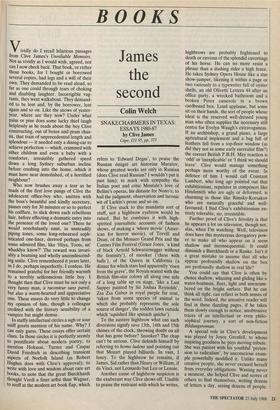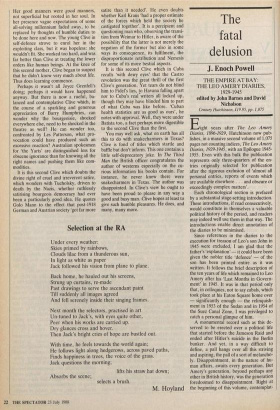BOOKS
Vividly do I recall hilarious passages from Clive James's Unreliable Memoirs. Not as vividly as I would wish, agreed, nor can I now check back. That book, or rather those books, for I bought or borrowed several copies, had legs and a will of their own. They demanded to be read aloud, so far as one could through tears of choking and disabling laughter. Incorrigible vag- rants, they went walkabout. They demand- ed to be lent and, by the borrower, lent again and so on. Like the snows of yester- year, where are they now? Under what palm or pine does some lucky thief laugh helplessly as he reads about the boy Clive constructing, out of boxes and pram chas- sis, that train of unprecedented length and splendour — it needed only a dining-car to achieve perfection — which, crammed with other children and even a baby with a comforter, irresistibly gathered speed down a long Sydney suburban incline before crashing into the home, which it must have near demolished, of a horrified neighbour?
Who now brushes away a tear as he reads of the first love pangs of Clive the adolescent office-boy who, smitten with the boss's beautiful and kindly secretary, pauses only for 30 minutes or so to perfect his coiffure, to slick down each rebellious hair, before effecting a dramatic entry into the presence of the loved one? There he would nonchalantly emit, in unsteadily piping tones, some long-rehearsed soph- isticated one-liner, derived perhaps from some admired film, like `Hiya, Toots, an' whaddya know?' The reward was invari- ably a beaming and wholly uncondescend- ing smile. Clive remembered it years later, as I do, perhaps imperfectly, I confess. He remained grateful for her friendly warmth to a terribly selfconscious little boy. I thought then that Clive must be not only a very funny man, a raconteur sans pareil, but also a warm-hearted and appreciative one. These essays do very little to change my opinion of him, though a colleague credited with the literary sensibility of a vampire bat might demur. In stuffy intellectual circles a sigh or sour sniff greets mention of his name. Why? I can only guess. These essays offer certain clues. In those circles it is perfectly seemly to pontificate about modern poetry, to mention Hokusai, Turner and Caspar David Friedrich in describing transient aspects of Norfolk Island (as Robert Hughes does with Clive's approval); to write with love and wisdom about rare art books, to note that the great Burckhardt thought Verdi a finer artist than Wagner, to scoff at the modern art book flap, which
James the second
Colin Welch
SNAKECHARMERS IN TEXAS: ESSAYS 1980-87 by Clive James Cape, £11.95, pp. 373 refers to 'Edward Degas', to praise the Russian émigré art historian Muratov, whose greatest works are only in Russian (does Clive read Russian? I wouldn't put it past him); to mark with sympathy the Italian poet and critic Montale's love of Bellini's operas, his distaste for Nono's; to hail the judgment, observation and laconic wit of Larkin's prose and so on.
If Clive stuck to this mandarin sort of stuff, not a highbrow eyebrow would be raised. But he combines it with high- spirited journalistic accounts of fashion shows, of making a 'whore movie' (Amer- ican for horror movie), of Torvill and Dean, of the Monaco Grand Prix and the Cannes Film Festival (Grace Jones, 'a kind of black Arnold Schwarzenegger without the feminity'), of snooker (`chess with balls'), of the Queen in California (a dinner for which stars had apparently 'risen from the grave', the Royals seated with the British film-star colony all along one side of a long table up on stage, 'like a Last Supper painted by Sir Joshua Reynolds', Zsa Zsa Gabor in royal purple fur coat, `taken from some species of animal to which she probably represents the sole source of danger', the sodden lawn outside which 'squished like spinach quiche').
To the austere highbrow what can such diversions signify save 13th, 14th and 15th chimes of the clock, throwing doubt on all that has gone before? Snooker? The chap can't be serious. Clive defends himself by referring to homo ludens and pointing out that Mozart played billiards. In vain, I fancy. To the highbrow he remains, if James, Sid rather than Henry or William, if da Vinci, not Leonardo but Len or Lennie.
Another cause of highbrow suspicion is the exuberant way Clive shows off. Unable to praise the restraint with which he writes, highbrows are probably frightened to death or envious of the splendid cavortings of his horse. He can no more resist a phrase than a dashing rider a high fence. He takes Sydney Opera House like a star show-jumper, likening it within a page or two variously to a typewriter full of oyster shells, an old Olivetti Lettera 44 after an office party, a wrecked bathroom and a broken Pyrex casserole in a brown cardboard box. Loud applause, but some sit on their hands, the sort of people whose ideal is the reserved well-dressed young man who often supplies the necessary still centre for Evelyn Waugh's extravaganzas. If an archbishop, a grand piano, a large agricultural implement and a bag full of feathers fell from a top-floor window (as did they not in some early surrealist film?) the correct British P.B.H. May reaction is `odd' or 'inexplicable' or 'I think we should leave'. Clive would manage something perhaps more worthy of the event. In defence of him I would call Constant Lambert, who long ago pointed out that exhibitionism, repulsive in composers like Hindemith who are ugly or deformed, is charming in those like Rimsky-Korsakov who are naturally graceful and well- favoured. I find Clive's exhibitionism en- tirely tolerable, no, irresistible.
Further proof of Clive's frivolity is that he appears a lot on television, though not, alas, when I'm watching. Well, television does have this mysterious derogatory pow- er to make all who appear on it seem shallow and inconsequential.. It could diminish a Burckhardt or a Ranke. Isn't it a great mistake to assume that all who appear profoundly shallow on the box are profoundly shallow in real life?
You could say that Clive is often by choice shallow, whizzing and gliding like a water-boatman, fleet, light and unencum- bered on the bright surface. But he can think all right, can reflect in both senses of the word. Indeed, the attentive reader will find in these dazzling pages, if he takes them slowly enough to notice, unobtrusive traces of an intellectual or even philo- sophical journey, a sort of non-fiction Bildungsroman.
A special role in Clive's development was played by Joyce Grenfell, to whose inspiring goodness he pays moving tribute. She was patient with his youthful 'preten- sion to radicalism', by unconscious exam- ple powerfully modified it. Unlike many creative people, she never excused herself from everyday obligations. Wasting never a moment, she helped Clive and scores of others to find themselves, writing dozens of letters a day, seeing dozens of people. Her good manners were good manners, not superficial but rooted in her soul. In her presence vague expectations of some all-solving millennium faded away, to be replaced by thoughts of humble duties to be done here and now. The young Clive in self-defence strove to enrol her in the exploiting class, but it was hopeless: she wouldn't fit. She worked too hard, and was far better than Clive at treating the lower orders like human beings. At the knee of this second mother, Clive began to suspect that he didn't know very much about life. Thus does learning commence.
Perhaps it wasn't all Joyce Grenfell's doing; perhaps it would have happened anyway. But there is now a rueful, ba- lanced and contemplative Clive which, in the course of a sparkling and generous appreciation of Barry Humphries, can wonder why the bourgeoisie, shocked everywhere else, need to be shocked in the theatre as well? He can wonder too, confronted by Les Patterson, what pro- vocation could have produced such an excessive reaction? Australian spokesmen for 'the Yarts' are distinguished less for obscene ignorance than for knowing all the right names and pushing them like com- modities.
It is this second Clive which doubts the divine right of cruel and irreverent satire, which wonders with Tucholsky, driven to death by the Nazis, whether ruthlessly satirising bourgeois democracy had ever been a particularly good idea. He quotes Golo Mann to the effect that post-1918 German and Austrian society 'got far more satire than it needed'. He even doubts whether Karl Kraus tad a proper estimate of the forces which held the society he castigated together'. It is a percipient and questioning man who, observing the transi- tion from Weimar to Hitler, is aware of the possibility that the latter is not merely the negation of the former but also in some ways its consequence, its fulfilment, the disproportionate retribution and Nemesis for some of its more bestial aspects.
It is this second Clive which in Cuba recalls 'with dewy eyes' that the Castro revolution was the great thrill of the first Clive's generation. Yet tears do not blind him to Fidel's lies, to Havana falling apart nor to Cuba's real writers all locked up, though they may have blinded him to part of what Cuba was like before. 'Cuban health statistics are as good as ours', he notes with approval. Well, they were under Batista too, a fact perhaps more digestible to the second Clive than the first.
You may well ask, what on earth has all this to do with snakecharmers in Texas? Clive is fond of titles which startle and baffle but don't inform. This one contains a little self-deprecatory joke. In The Third Man the British officer congratulates the author of westerns especially on the cu- rious information his books contain. For instance, he never knew there were snakecharmers in Texas. The author was disappointed. In Clive's view he ought to have been proud to please in any way a good and busy man. Clive hopes at least to give such humble pleasures. He does, and many, many more.















































 Previous page
Previous page